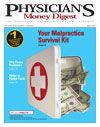Publication
Article
The Economy: Coming in for a Landing
Author(s):
There is little question that the US economy isslowing down, with the significant increasesin short-term interest rates by the FederalReserve over the past 2 years, and the current downturnin the domestic housing market. The big debatenow, however, is whether the country will experiencea "hard" landing—a recession—or come in with a"soft" landing, by slowing and posting a modestgrowth rate.
A Glance at the Past
To understand the origins of this debate, we needto take a look at recent history to help us see wherewe are and how we got here. Over the past 5 years,the economy has fluctuated between two extremes.First, the economy was weak from 2001 to 2003with output declining or rising slowly. From there,the economy rebounded to robust, above-averagegrowth from 2004 through early 2006.
As the economy picked up steam in mid-2004, theFed gradually raised interest rates to encourage moderategrowth and temper the potential for inflation.The 17 successive quarter-point interest-rate hikeshelped drain excess liquidity from the economy,while allowing borrowers time to adjust to tightercredit conditions. Keep in mind, the full effects of Fedtightening are usually felt about a year and a halfafter it takes place, so the impact of the most recentcycle that ended in June 2006 may not be fully realizeduntil mid-2007.
In addition to the rate hikes, several other factorshave emerged over the last year that have also helpedslow economic growth and increase the likelihood ofa soft landing. Energy prices dropped sharply duringthe second half of the year, enabling consumers tostretch their incomes a little further. In addition, theFed's interest rate hikes helped cool the overly inflatedhousing market. Once the weakness in the housingsector became pronounced, the Fed stopped raisinginterest rates, at least for the time being.
In the meantime, lending credence to the soft landingscenario is the fact that corporate profits havecontinued to grow, giving companies sufficient fundsto expand payrolls and increase capital spending.This will help sustain economic growth, albeit at amore modest and manageable pace.
The Role of Geopolitical Events
It's important to remember, however, that geopoliticalevents are always a factor when looking at theprospects for the economy. With the current challengesfacing our country—the conflict in Iraq, the resurgenceof the Taliban in Afghanistan, and the nuclear ambitionsof Iran and North Korea—the probability of anadverse geopolitical event that could jolt the economyand bring about a hard landing has increased.
However, all things considered, absent a majorgeopolitical event, we expect a soft landing for theeconomy in the year ahead with economic growthslowing—not stalling.
Joseph F. Lagowski is vice president, investments, and a financialconsultant with AG Edwards in Hillsborough, NJ. He welcomesquestions or comments at 800-288-0901, or visit www.agedwards.com. This article was provided by AG Edwards & Sons, Inc,member SIPC.
